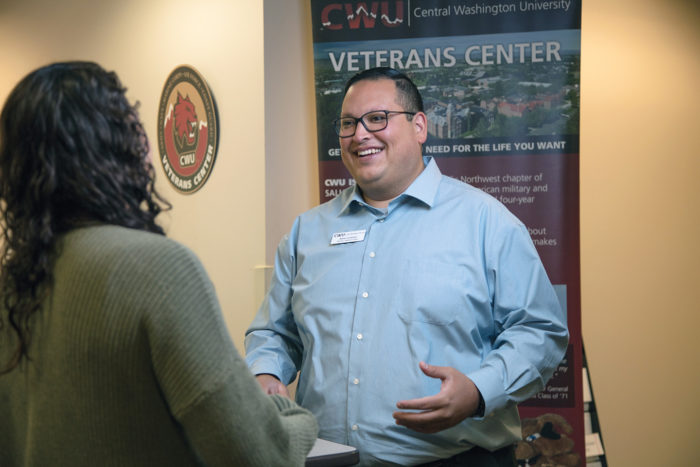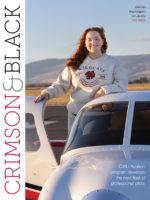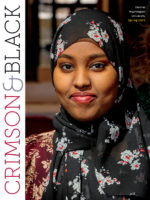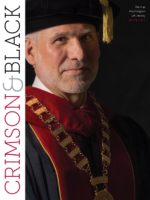

CWU’s support for the armed services dates back to World War I, when the university conducted regular bond drives and hosted “community sings,” where as many as 500 people would gather to sing patriotic tunes like “Over There” and “Keep the Home Fires Burning.”
Later, Central established more formal support for its student-veterans when it created a Veterans Affairs Office. The headquarters was replaced in 2009 by the Veterans Services Office, a full-resource center for those leaving active duty and entering higher education.
At the time it was created, the office was—and still is, to a degree—atypical among higher education institutions.
“Not a lot of campuses—even Tier 1 ‘destination schools,’ as I would call them—have dedicated spaces for their student-veterans,” said Ruben Cardenas, CWU Veterans Center director.
The center was established in response to interest from student-veterans who wanted a one-stop-shop to access a range of services, such as help with GI Bill paperwork to getting connected with health care—even just having a place to interact with peers.
It was relocated into its own, larger space in 2019. Cardenas considers that a milestone for the university and its student-veterans.
“There’s some symbolism that the university is displaying by having a dedicated space—that we care about this student population,” he said. “And our students feel a little more welcome in a space that is dedicated to them.”
Among that group is Sherice Fraser, who tries to help her peers feel more welcome through her role as the student Veterans Club president. The club offers a way for members to come together, build community, and learn about available resources.
“We also host what we call the VEG (Veterans Experience Group), when those within the ROTC (Reserve Officer Training Corps), active military and veterans come and talk about their experiences,” Fraser said. “It’s also an opportunity for students to voice their opinions and make suggestions for changes, which we write down and then present [to university officials].”
The club also sponsors field trips to military sites and museums. These educational experiences are open to club members without prior military service or training, as CWU’s Veterans Club is open to all university students. Last year, the club had 71 members, including student-veterans, those with no military experience, alumni, senior faculty and staff (42% are alumni).
Fraser is a veteran herself. She joined the Army and served for over six years at Fort Hood, Texas; Fort Riley, Kansas and Joint Base Lewis-McChord (JBLM), south of Tacoma. She is among the roughly one-in-three CWU student-veterans who are women.
Student-veterans like Fraser can’t succeed if they can’t get into the classes they need or afford them. In response, CWU has established a priority-registration process for student-military members. The students and their family members also may qualify for lower state tuition, regardless of where they call home—even Kingston, Jamaica, like Fraser.
In 2010, she and her family emigrated to Miramar, Florida, where she attended high school. She decided to enlist in the Army to help her pay for college, and her decision to attend CWU was directly tied to her time at JBLM.
“One of my friends, who was prior active duty, was going to Central and he told me all about the school,” she explained. “So, I reached out to Central and the communication I had with staff was good. My paperwork was processed quickly and I was able to get in on time to start ROTC and my college classes.”
Along with receiving her bachelor’s degree in communications next June, Fraser will be commissioned as a U.S. Army second lieutenant and will join the National Guard.
CWU also prides itself in recognizing student-veterans for their academic accomplishments. The university’s chapter of the SALUTE (Service, Academics, Leadership, Unity, Tribute, and Excellence) Veterans National Honor Society was the first one established in the Pacific Northwest in 2012. It is one of just 81 national chapters at U.S. colleges and universities.
“I had a couple of student-veterans come and tell me about the honor society, and they said they thought we should get that going here at CWU,” explained Ralf Greenwald, CWU’s SALUTE chapter faculty director. “It’s awesome that it was a charge led by student-veterans. It’s in line with Central’s value of having a veterans-friendly campus. We’ve come leaps and bounds from where we first started.”
Greenwald, a Navy veteran who served in Desert Storm, is the only faculty director the chapter has had.
“This is one of the small ways in which I feel I can give back to Central and the vet community,” he added. “I would have loved to have something like this when I was a student.”
To be inducted into CWU’s SALUTE chapter, undergraduate student-veterans must have an overall grade-point average of at least 3.0 (3.5 for graduate students). They also must have either an honorable discharge from the armed forces, or be currently serving on active duty or in the National Guard or reserves.
“Veterans gets honored for lots of things, but generally, academics tend to fall by the wayside,” said Greenwald, who is also a CWU psychology professor.
In their honor, SALUTE hosts an annual, formal recognition dinner and indoctrination ceremony for its members, their families, and friends prior to graduation. During a typical year, about a dozen students are honored, with 30 percent of them graduate students.
CWU extends its outreach efforts to student-veterans beyond campus through associations and partnerships with many outside organizations, such as the Kittitas County Veterans Coalition. The coalition also can help identify, and meet, emerging needs of student-veterans and their families.
“Easing the transition from military to student life as much as possible for our student-veterans is the goal,” Cardenas said.






comments powered by Disqus